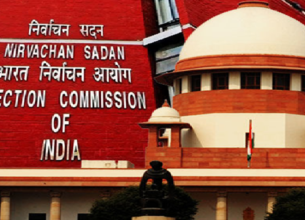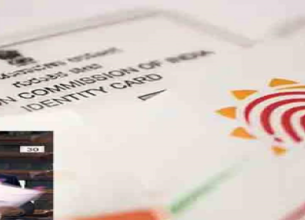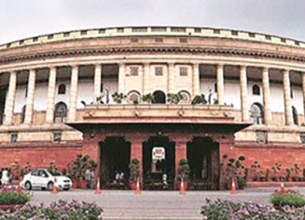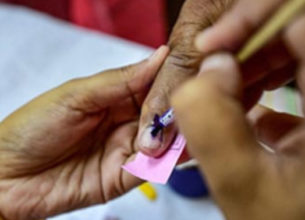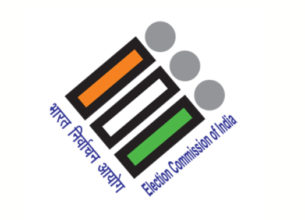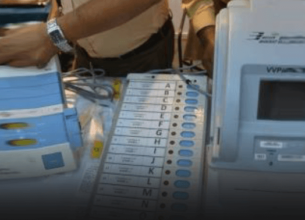EC MOOTS LINKING AADHAAR WITH VOTER IDS
06, Mar 2020

Prelims level : Election and Electoral Reforms
Mains level : GS-II Appointment to various Constitutional posts, powers, functions and Responsibilities of various Constitutional Bodies
Why in News?
- Recently the Election Commission (EC) has proposed the Law Ministry to link the Aadhaar card with the Election Photo Identity Card (EPIC) to prepare an error free electoral roll.
What is the Issue?
- The General Elections 2019 witnessed discrepancies in voter eligibility and rolls, and the resultant denial of voting rights of many.
- Migrant labours and workers are unable to vote if they are away from their homes at the time of elections.
- The disenfranchisement of voters is likely due to four factors which are discussed below, calling for Aadhaar as a solution to resolve them.
What are the Problems Faced?
1. Issues with Registration:
- Several people are unable to register to vote.
- The reasons for this range from not being aware of the registration methodology, to the process itself being inconvenient to not even knowing there is one.
- Challenges – It is the responsibility of the Election Commission of India (ECI) to inform the eligible voters who have not registered yet.
- The ECI does this via mass campaigns since it is not possible for it to exclusively identify unregistered adult citizens.
- Currently, the easiest way to freshly apply to be registered as a voter is to fill out a Form 6 on the NVSP (National Voters’ Service Portal) or the ECI’s app.
- However, this is an extremely cumbersome exercise and potentially an impediment to comprehensive voter registration efforts.
- Way out – Aadhaar can significantly simplify the process, once the ECI has ascertained that a resident is eligible to vote.
- This whole process could be replaced with a single step Aadhaar based e-KYC.
2. Problem in Voter Rolls:
- Several government functionaries have discretionary powers that empower them to remove names from voter lists.
- Additionally, the ECI has the right to disqualify citizens from voting under certain conditions as per the Constitution.
- The ECI maintains and it is indeed mandated to publish a list of people disqualified from voting in each state.However, the reasons for their disqualifications are not included and likely not recorded either.
- Concerns – There are people who have voted at a particular booth previously but have been omitted from the voter rolls.
- In many cases, the ECI does not have the contact details (or updated ones) of voters to notify them before a deletion takes place.
- The absence of contact information was due to the fact that up until recently, the ECI did not collect these details.
- In cases where they have contact details, the changes in the same are not made by voters unless the Electors Photo Identity Card (EPIC) is their de facto ID.
- Besides, the most disturbing factor is the political adventurism of parties (and politicians) and voters alike.
- There have been cases reported of voters who are registered to vote in multiple booths and, thus, can vote multiple times.
- Way Out– During registration, Aadhaar holders could give consent to the ECI to have their contact details shared.
- In that case, they could be pre-emptively notified about an impending deletion.
- The illegality of private and political actors in regards with voters roll needs to be checked.
- Here, Aadhaar’s anti-fraud and de-duplication features can be put to use.
3. Discrepancies in Details:
- Concern:Several people have been turned away from voting due to discrepancies between their details on the rolls and the ID documents they present for validation.
- Generally, people who get married or have recently changed other demographic parameters might make the necessary changes to their Aadhaars and neglect other IDs.
- Way Out –In such cases, reliance on Aadhaar will mitigate the risks of exclusion that are a consequence of demographic data mismatches.
4. Relocation:
- The most easily addressable cause of disenfranchisement is relocation.
- Concern:It is often the case that people who have made the requisite changes will feature both on the voter list of their new and previous residences.
- Way Out:Here too, it is far more likely for people to update Aadhaar rather than their EPIC.
Way Forward:
- Many of the exclusions discussed above can be remedied with Aadhaar.
- It uniquely identifies every individual in the country through all of the same details as the EPIC.
- Also, unlike EPIC, Aadhaar captures biometric data, which is useful in validating uniqueness.
- Ironically, the EPIC does not guarantee a vote; if a name does not appear on the voter rolls, she will not be permitted to vote.
- Even if a person’s name does appear on the voter rolls, the EPIC is not the only document that is accepted as proof of identity.
- Therefore, the very existence of the EPIC is worth reconsidering today.
- In this regard, the ECI publicly expressed its interest in seeding their databases with Aadhaar.
- It also attempted a drive to voluntarily link Aadhaar to voter IDs but was halted by the Supreme Court in 2017.
- There have been recent reports, however, suggesting that the ECI has been preparing to resume these activities.
- Given that Aadhaar is the only universal, de-facto identification infrastructure in India today, the move could be taken further.




